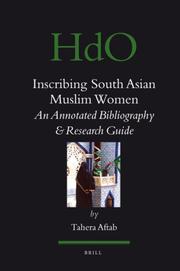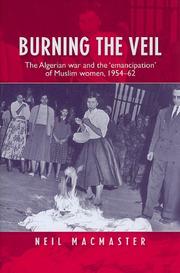| Listing 1 - 10 of 185 | << page >> |
Sort by
|
Book
ISBN: 198844909X 9781988449098 9781927494974 1927494974 9781927494820 1927494826 Year: 2016 Publisher: Mawenzi House Publsihers
Abstract | Keywords | Export | Availability | Bookmark
 Loading...
Loading...Choose an application
- Reference Manager
- EndNote
- RefWorks (Direct export to RefWorks)
"These are twenty-two personal stories, told by women from practically all backgrounds and persuasions--devout and not-so devout, professionals and housewives, westernized and traditional, wearing jeans, hijab, or niqab, and originally from Africa to North America to Pakistan to the Middle East--revealing in their own ways what it means to them to be a Muslim woman (a "Muslimah"). What we get is a complex of stories, all united by two simple ideas--faith and nationality (Canadian). Included here is an account by Zunera Ishaq, who challenged the Harper government in court on the issue of niqab."--
Muslim women --- Social conditions. --- Islamic women --- Women, Muslim --- Women --- Muslimahs
Book
ISBN: 935280502X 9352805011 9789352805020 9789352805013 9789352805006 9352805003 9353289874 Year: 2018 Publisher: Los Angeles, [California] : Sage,
Abstract | Keywords | Export | Availability | Bookmark
 Loading...
Loading...Choose an application
- Reference Manager
- EndNote
- RefWorks (Direct export to RefWorks)
The book analyses Indian Muslim women's narratives, bringing forth 'voices' that have long been considered 'silent' and challenges the image of Muslim women as victims of Islam.
Muslim women --- Islamic women --- Women, Muslim --- Women --- Muslimahs
Book
ISBN: 1447302885 1282501666 9786612501661 1847427855 1847424104 Year: 2009 Publisher: Bristol, UK ; Portland, OR : Policy,
Abstract | Keywords | Export | Availability | Bookmark
 Loading...
Loading...Choose an application
- Reference Manager
- EndNote
- RefWorks (Direct export to RefWorks)
This book presents the stories of twenty women from Bradford between the ages of 14 and 80. It offers an intricate mosaic of the experiences, views and hopes of these women and in so doing it emphasises the power of people's lives to aid deeper debate and understanding, and gives voice to an important and often marginalised group.
Muslim women --- Social conditions. --- Women --- Islamic women --- Women, Muslim --- Muslimahs
Book
ISBN: 1527534790 1527536203 9781527536203 9781527534797 Year: 2019 Publisher: Newcastle upon Tyne, UK : Cambridge Scholars Publishing,
Abstract | Keywords | Export | Availability | Bookmark
 Loading...
Loading...Choose an application
- Reference Manager
- EndNote
- RefWorks (Direct export to RefWorks)
Muslim women --- Islamic women --- Muslimahs --- Women, Muslim --- Women

ISBN: 1281921858 9786611921859 9047423852 9789047423850 9781281921857 9789004158498 9004158499 Year: 2008 Publisher: Leiden ; Boston : Brill,
Abstract | Keywords | Export | Availability | Bookmark
 Loading...
Loading...Choose an application
- Reference Manager
- EndNote
- RefWorks (Direct export to RefWorks)
With its trans-historic and comprehensive annotated sources, this volume serves as a kaleidoscope through which the reader glimpses the shifting patterns of the private and the public lives of South Asian Muslim women.
Islamieten. --- Vrouwen. --- Muslim women --- Musulmanes --- Islamic women --- Women, Muslim --- Women --- Zuid-Azië. --- Muslimahs
Book
ISBN: 0674495969 0674089081 9780674089082 9780674736368 0674736362 9780674495968 Year: 2015 Publisher: Cambridge, MA : Harvard University Press,
Abstract | Keywords | Export | Availability | Bookmark
 Loading...
Loading...Choose an application
- Reference Manager
- EndNote
- RefWorks (Direct export to RefWorks)
When the Abbasids overthrew the Umayyads in 750 CE and ushered in Islam’s Golden Age, ideas about gender and sexuality were central to the process by which the caliphate achieved self-definition and articulated its systems of power and thought. Nadia Maria El Cheikh’s study reveals the importance of women to the writing of early Islamic history.
Muslim women --- Abbasids --- Caliphs --- Islamic women --- Women, Muslim --- Women --- History. --- Islamic Empire --- History --- Muslimahs
Book
ISBN: 9970929062 9789970929061 9970929089 9789970929085 9970929100 9789970929108 9970929011 9789970929016 9789970929009 9970949624 Year: 2014 Publisher: [Place of publication not identified] : Strategic Initiative for Women in the Horn of Africa,
Abstract | Keywords | Export | Availability | Bookmark
 Loading...
Loading...Choose an application
- Reference Manager
- EndNote
- RefWorks (Direct export to RefWorks)
Muslim women. --- Islamic women --- Women, Muslim --- Women --- Women in Islam --- Muslim women --- Islam --- Social conditions. --- Muslimahs
Book
ISBN: 9351508234 9789351508236 9351508242 9351508250 Year: 2016 Publisher: New Delhi, India : Sage,
Abstract | Keywords | Export | Availability | Bookmark
 Loading...
Loading...Choose an application
- Reference Manager
- EndNote
- RefWorks (Direct export to RefWorks)
Traces the evolution of Muslim women's position in the Indian society, from the 1930's to the present
Muslim women --- Feminism --- Islamic women --- Women, Muslim --- Women --- History. --- Bhatty, Zarina. --- Muslimahs

ISBN: 1526146185 9781526146182 0719074738 0719087546 9780719087547 Year: 2020 Publisher: Manchester University Press
Abstract | Keywords | Export | Availability | Bookmark
 Loading...
Loading...Choose an application
- Reference Manager
- EndNote
- RefWorks (Direct export to RefWorks)
Burning the veil draws upon sources from newly-opened archives, exploring the ‘emancipation’ of Muslim women from the veil, seclusion and perceived male oppression during the Algerian War of decolonisation. The claimed French liberation was contradicted by the violence inflicted on women through rape, torture and destruction of villages. This book examines the roots of this contradiction in the theory of ‘revolutionary warfare’, and the attempt to defeat the National Liberation Front by penetrating the Muslim family, seen as a bastion of resistance. Striking parallels with contemporary Afghanistan and Iraq, French ‘emancipation’ produced a backlash that led to deterioration in the social and political position of Muslim women. This analysis of how and why attempts to Westernise Muslim women ended in catastrophe has contemporary relevance and will be important to students and academics engaged in the study of French and colonial history, feminism and contemporary Islam.
Muslim women --- Algeria --- History --- Islamic women --- Women, Muslim --- Women --- Religion --- Islam --- General --- Muslimahs
Book
ISBN: 1108245609 1108227074 1108247318 1316510476 1316649970 Year: 2018 Publisher: Cambridge : Cambridge University Press,
Abstract | Keywords | Export | Availability | Bookmark
 Loading...
Loading...Choose an application
- Reference Manager
- EndNote
- RefWorks (Direct export to RefWorks)
Why are Muslim and Arab women less likely to be part of the modern labor force? A popular answer claims that it is the unique cultural and religious heritage of these women that leads them to choose or to follow options other than participating in the labor force. In many Muslim countries legislation is explicitly based on the Shari'a (Islamic law), and "family laws and practices treat women as inferior to men" (Hajjar 2004). Many Muslim countries also deliberately avoid labor laws that ban gender discrimination, do not provide maternity leaves, do not legislate affordable child care, and formally resist the UN Convention on the Elimination of All Forms of Discrimination against Women (CEDAW; Sonbol 2010; cf. Afkhami and Friedl 1997; Anwar 2009; Sadiqi and Annaji 2011).
Women, Arab --- Muslim women --- Islamic women --- Women, Muslim --- Women --- Arab women --- Employment --- Muslimahs
| Listing 1 - 10 of 185 | << page >> |
Sort by
|

 Search
Search Feedback
Feedback About UniCat
About UniCat  Help
Help News
News